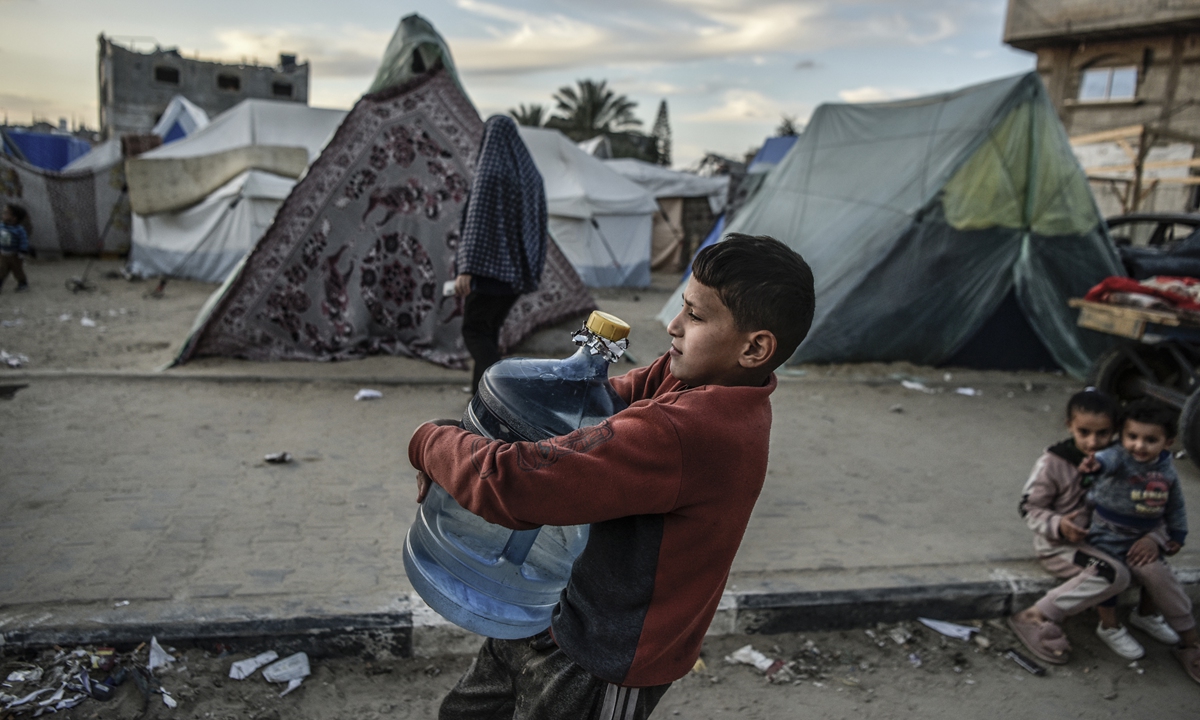
A child carries a water bottle at makeshift tents set up near the border of Egypt as Israeli attacks continue on March 09, 2024, in Rafah, Gaza. Photo: VCG
Negotiations over a cease-fire in Gaza are unlikely to achieve a breakthrough before the start of Ramadan, media reported. Analysts said that the key reason is that Israel just wants to have a temporary cease-fire, and Hamas and Palestinians in Gaza believe that if the cease-fire is temporary, the conflict will return to the region after Israeli forces take a break.
For Palestinians, the temporary cease-fire based on prisoners swap proposed by Washington is not reliable, because if Gaza's border remained blockaded by Israel during the pause while Israeli forces can receive further supplies from the US to enable them to restart the conflict to cause more bloodsheds, it would not be a fair deal for Hamas and the people in Gaza, and this is why the US was unable to make the conflicting parties to reach a deal, according to Chinese experts.
The only feasible and correct way to realize cease-fire is to pass a resolution for immediate cease-fire at the UN Security Council and open the Gaza border to let the people there receive humanitarian aid, but unfortunately, attempts by the international community have been vetoed by Washington over and over again, analysts noted.
Efforts to secure a deal on a cease-fire between Israel and Hamas in Gaza are ongoing, Israel's intelligence agency Mossad said on Saturday, despite dimming hopes for a truce during the Muslim holy month of Ramadan, Reuters reported.
Mei Hualong, an assistant professor at Peking University on Middle East studies, told the Global Times that Israel and some Western media are trying to make Hamas look like the one who should be blamed, but in fact, Palestinians consider the deal as unfair.
"Israel might need a pause to let its military forces to have a break and receive more supplies, and to have time to focus on dealing with the threat from Hezbollah, so a six-weeks pause is what Israel needs as long as it can make sure that Hamas receive no more supplies from outside, and this is why Israel wants Gaza to remain blockaded," Mei noted.
"But for Hamas and Palestinians who live in the region, they know that this is truly unfair and unacceptable, as they deeply believe that after six weeks, or shorter, Israeli forces who get strengthened will return as Hamas and Palestinians get weakened. That's why the US was unable to make the deal happen and fails to win trust from Hamas," Mei said.
According to Aljazeera, a senior Hamas official Osama Hamdan said on Tuesday that his group wants a permanent cease-fire, rather than a six-week pause, and a "complete withdrawal" of Israeli forces.
"The security and safety of our people will be achieved only by a permanent ceasefire, the end of the aggression and the withdrawal from every inch of the Gaza Strip," Hamdan told reporters in Beirut. Israeli Prime Minister Benjamin Netanyahu has publicly rejected those demands and repeatedly pledged to continue the war until Hamas is dismantled and all the captives are returned, Aljazeera reported.
For the Netanyahu government, to keep the war away from ending is about the existence of its wartime cabinet, and this is the key concern of Israeli leaders, so the international pressures about humanitarian crisis in Gaza is not a big deal for them, and all they care is the attitude of the US, and the supports provided by the Biden administration is the source to enable Israel to maintain its military operation in Gaza, experts said.
Not only the hope for a cease-fire is fading, US President Joe Biden's faith in Netanyahu is also fading. After the State of the Union speech, Biden was caught on a hot mic expressing frustration with how Netanyahu is conducting Israel's war with Hamas amid mounting civilian casualties.
The US president said on Thursday that he and the Israeli prime minister were headed toward a "come-to-Jesus meeting" over the humanitarian crisis in Gaza, according to an audio clip of the president's remarks posted on social media on Friday.
It is now clear that despite facing pressure from the international community and domestic voters, the Biden administration is unable to have any influence over Israel. And while receiving demands to do more, Washington remains reluctant to put pressure on Israel, and it has suspended its support. As a result, the conflict is unlikely to end soon, experts said.




